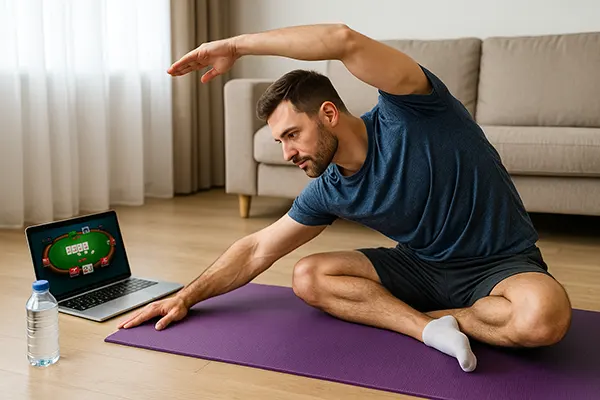
Physical Conditioning for Poker Players: Fitness, Sleep, and Nutrition as a Competitive Edge
Poker in 2025 demands far more than technical skill and psychological discipline. Long sessions, rapid decision-making and sustained concentration place significant pressure on the body. Well-structured physical conditioning has become a practical tool for serious players who want to maintain clarity, stay consistent during lengthy tournaments and reduce the risk of fatigue-driven mistakes. Fitness routines, healthy sleep habits and balanced nutrition form a foundation that strengthens both stamina and cognitive stability at the table.
Fitness as a Strategic Component of Poker Performance
Regular physical activity supports mental endurance, which directly affects the quality of strategic decisions during multi-hour sessions. Strength training, moderate cardio and mobility exercises help stabilise posture, prevent back and neck strain and maintain steady energy levels. In 2025, many professional players include scheduled workouts in their weekly routine to avoid the physical exhaustion that often leads to emotional swings and rushed choices.
Physical fitness also strengthens stress tolerance. High-pressure environments trigger cortisol spikes, and consistent exercise has been shown to regulate stress hormones and improve emotional self-control. This translates into fewer tilt reactions, more consistent decision-making and better risk evaluation during complex hands.
An additional benefit is improved circulation. Better blood flow ensures the brain receives oxygen more efficiently, supporting concentration, faster analytical thinking and smoother transitions between strategies. Even simple habits such as stretching breaks during long sessions can counter feeling sluggish and enhance awareness.
Practical Fitness Routines Adapted for Poker Players
A balanced routine does not require intense athletic training. Thirty-minute sessions focusing on functional strength and posture are sufficient for most players. Exercises targeting the core, upper back and shoulders help maintain comfort while sitting for hours and reduce the likelihood of muscle tension that distracts from the game.
Low-impact cardio options—such as brisk walking, cycling or rowing—are particularly suitable. They improve endurance without overwhelming the nervous system, which is essential for players who need calm, stable focus during tournaments. Many professionals use short daily sessions rather than long, exhausting workouts.
Mobility and flexibility training complement strength and cardio. Light stretching, yoga or Pilates improve posture and reduce joint stiffness, supporting both comfort and emotional balance. These routines are easy to integrate between reviewing hands or analysing play, making them a practical part of a poker-focused schedule.
Healthy Sleep Patterns for Sustained Mental Clarity
Sleep influences memory, emotional stability and decision speed. Players who face extended tournaments, travel schedules and high-stress environments rely on consistent rest to maintain peak performance. A proper sleep routine reduces cognitive lapses and reaction delays that often occur after long gaming sessions or late-night analysis.
Research emphasises the importance of deep sleep for information processing. Poker players frequently study hand histories, ranges and psychological reads; restful sleep helps consolidate these insights more effectively. Without it, strategic work loses efficiency and the ability to recall patterns quickly diminishes.
Maintaining a stable circadian rhythm is equally important. Irregular sleep disrupts focus and increases irritability, which in turn leads to impulsive decision-making. In 2025, many professionals use sleep-tracking tools to monitor patterns and adjust their schedule around tournaments to stay mentally sharp.
Building a Sleep Routine Suitable for Tournament Play
Players benefit from creating a pre-sleep ritual that helps the body transition into rest, particularly during periods of travel. Dimming lights, limiting screens and avoiding stimulating activities before bed can improve sleep quality and shorten the time needed to fall asleep.
Consistency is key. Going to bed and waking up at similar hours—even during breaks in tournament scheduling—helps stabilise hormonal balance and improve next-day alertness. This prevents the grogginess that often affects decision accuracy.
Environmental adjustments such as blackout curtains, comfortable bedding and maintaining room temperature between 18–20°C support deeper, uninterrupted sleep. These small adjustments allow poker players to recover more efficiently between demanding sessions.

Nutrition as the Foundation for Mental and Physical Stamina
A balanced diet plays a critical role in sustaining energy and concentration throughout long sessions. Stable glucose levels prevent sudden drops in alertness, while nutrient-dense meals improve cognitive functioning. Many players in 2025 work with nutritionists to personalise their diet based on metabolism, schedule and stress levels.
Proteins, healthy fats and complex carbohydrates offer slow, steady energy release instead of quick spikes followed by fatigue. Hydration is equally important: even mild dehydration can impair focus, reduce reaction speed and worsen decision accuracy. Regular water intake is essential during both training and tournament play.
Healthy snacking has become a practical strategy for maintaining consistency. Options like nuts, fruit, yoghurt and whole-grain crackers support concentration without overwhelming the digestive system. Heavy meals often lead to lethargy, which is particularly harmful during long sessions.
Daily Nutrition Practices That Support Poker Performance
Breakfast should provide stable energy—options such as oats, eggs, berries or whole-grain toast offer slow-release carbohydrates and essential nutrients. This prevents mid-morning fatigue and supports productive study or early event participation.
Lunch and dinner should prioritise lean proteins, vegetables and whole grains. These meals help maintain sharpness throughout the day and avoid the post-meal slump that often disrupts focus. Meal timing matters as well: eating too close to the start of a session may reduce mental clarity.
Supplementation is beneficial when used responsibly. Omega-3 fatty acids, vitamin D and magnesium support cognitive function, mood stability and muscle recovery. However, supplements should complement—not replace—a balanced diet tailored to the demands of professional play.
